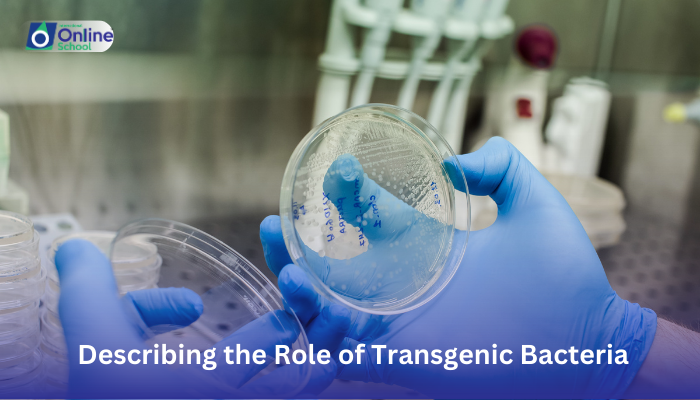
Learning Outcomes:
i. Describe the role of transgenic bacteria in the production of various biopharmaceuticals, highlighting their unique capabilities and advantages.
ii. Understand the different techniques used to engineer bacteria for specific biopharmaceutical production.
iii. Appreciate the importance of transgenic bacteria in advancing healthcare and addressing global health challenges.
Introduction:
Imagine a microscopic factory, churning out life-saving medicines and vital medical supplies. This isn't a futuristic vision; it's the reality of transgenic bacteria, tiny powerhouses engineered to produce a diverse range of biopharmaceuticals. Today, we dive into this microscopic world, exploring how these miniature marvels revolutionize healthcare by crafting the tools and treatments we rely on for a healthier life.
i. Tiny Workers, Big Impact: Applications of Transgenic Bacteria:
Insulin production: Transgenic bacteria engineered with the human insulin gene can efficiently produce this vital hormone, providing a reliable source for diabetics worldwide.
Antibiotics and vaccines: Bacteria can be modified to manufacture specific antibiotics, combating drug-resistant bacteria and protecting us from infectious diseases.
Diagnostic tools and enzymes: Engineered bacteria produce enzymes and proteins used in diagnostic tests and medical treatments, enhancing healthcare accuracy and efficiency.
Bioremediation and environmental cleanup: Bacteria can be designed to degrade pollutants or produce biofuels, contributing to environmental sustainability and resource conservation.
ii. The Engineering Toolbox: Modifying Bacteria for Biopharmaceutical Production:
Recombinant DNA technology: Scientists isolate and manipulate genes, inserting them into bacteria to instruct them to produce desired proteins.
Gene editing tools: Techniques like CRISPR-Cas9 allow for precise modification of bacterial genomes, creating even more efficient and targeted biopharmaceutical production.
Metabolic engineering: Scientists optimize bacterial metabolism to enhance desired product yields and improve efficiency of the production process.
iii. Advantages of Using Transgenic Bacteria:
Cost-effective and scalable: Bacteria multiply rapidly and can be grown in large fermenters, making biopharmaceutical production affordable and efficient.
Flexible and adaptable: Bacteria can be engineered to produce a vast array of biopharmaceuticals, offering solutions for diverse medical needs.
Environmentally friendly: Compared to traditional production methods, bacterial production often has a lower environmental footprint.
iv. The Future of Tiny Titans: Challenges and Opportunities:
Safety and regulatory considerations: Ensuring the safety and efficacy of biopharmaceuticals produced by transgenic bacteria requires robust regulatory frameworks.
Ethical concerns: Addressing potential risks and ensuring equitable access to these life-saving technologies are crucial for responsible development.
Continuous research and development: Advancements in genetic engineering and biotechnologies will further enhance the potential of transgenic bacteria in biopharmaceutical production.
Transgenic bacteria, once considered mere microscopic marvels, have transformed into essential partners in healthcare. Their ability to produce biopharmaceuticals efficiently and cost-effectively offers immense potential for advancing medical treatments, addressing global health challenges, and ensuring a healthier future for all. By appreciating their power, understanding the challenges, and embracing responsible development, we can leverage these tiny titans to create a world where everyone has access to the life-saving medicines they need.